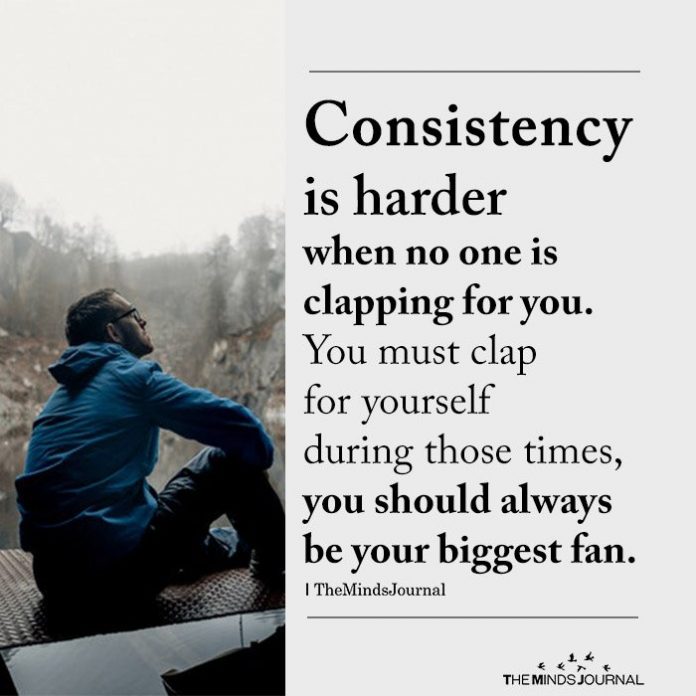Are you unable to stick to your diet plan? Or failing to lose weight even after several attempts? All you need to know is that there is a lack of consistency in losing weight.
Consistency is the magic key.
We’re bombarded with weight loss and diet advice every day and everyone says the same thing about theirs – “scientifically proven”, “best way to burn fat forever”, “easy to follow”, “secret fat burning system”, “lose stubborn fat and keep it off”… literally, they all claim the same things but they all require the same thing.
Most people who start a diet fall off it before even losing any weight and 95-98% of those who do lose weight, regain it all within a year and as many as 2/3’s of them will be even heavier than when they started within 5 years.
The truth is, ANY diet that puts you in a caloric deficit if consistently followed forever, will result in weight loss and ultimately weight maintenance.
Yes, ANYTHING you do that puts you in a caloric deficit will result in weight loss and ANYTHING you do that results in your eating at maintenance consistently will result in maintaining. You don’t even need to do a “diet” …as long as you’re eating less than your body is burning, you will lose weight.
Despite their claims, multiple meta-analysis of long-term diet studies have shown that no one diet really works a whole lot better than any other in terms of how and how quickly they help shed body fat – there’s often not much more than a 1-3lb difference between them.
And, ANY diet that you consistently continue to follow AFTER you reach your goal, that keeps you in a deficit will help you keep the weight off – again, no one diet really works any better than another here either.
Notice the key point in those two truths?
Consistency.
Without consistency, they are all completely worthless – actually, worse than worthless. Dieting often causes a whole host of other problems, both mental and physical, in a large majority of people.
So, CONSISTENCY is the biggest factor in determines whether or not you’ll be successful at losing weight and keeping it off. Without it, nothing will work. With it, just about anything will.

But consistency is the exact thing that people struggle with most be it losing weight or achieving life goals. That’s why so many people spend so many decades hopping back and forth between dozens of different diets – trying to find that magic one that they can FINALLY be consistent on.
But it rarely works because until now nothing ever really did anything to change the reasons WHY we struggle with consistency.
There are several reoccurring themes I’ve seen over the years that most commonly keep people from being consistent.
The 8 Biggest Reasons (in no particular order) You Struggle With Consistency are:
1. Wiring in our brains.
Our brains are incredibly complex and have, since the beginning of time, been designed for survival. They have all kinds of annoying little tricks to make sure we stay alive and the wiring in our habit center is one of them.
What’s the first thing that happens when certain foods are off limits? Pretty much the second you decide a food is off limits you suddenly can’t stop thinking about it and craving it, right?
That’s a survival instinct that’s literally been hard wired into our brains since the beginning of time. Food equals survival so when food restriction is introduced, our brains get scared and start trying to force us to “cave” and eat that thing we think we’re not supposed to have. Then, when we finally do cave, our brains get rewarded because they love food!
That’s when the habit centre kicks in and start wiring the cycle of craving and caving as an auto-pilot habit that we don’t even really control after awhile. The more you do it, the more you teach your brain that cravings = rewards and the harder it becomes to “stick to” anything.
Have you noticed that when you first started dieting it seemed easier to stick to them and the more years that have passed the harder it’s become?
That’s why. The longer this cycle repeats, the more ingrained the act of “caving” becomes. This is one of the biggest reasons most people struggle with dieting – because diets, especially the super restrictive fad ones, are SO restrictive of food. It’s also why eliminating food rules & restrictions is required.
Read Your Brain Is a Liar: 7 Common Cons Your Brain Uses
2. Self-sabotage from limiting beliefs/the way we feel about ourselves.
The stories that we tell ourselves about weight, food, our bodies, what we’re capable of, even our worth determine the outcome of damn near everything in our lives. If we continually tell ourselves we’re failures, we’re quitters, we always screw up anyway, we believe those things to be true of ourselves and we act accordingly.
When we don’t trust ourselves or believe in our ability to be successful, we self-sabotage – because why on earth would we keep going when things get tough if we don’t think we can do it anyway?
If we’ve already decided going in that we’re just going to screw up because we always do, we’ll just keep quitting as soon as it gets tough or inconvenient. Also, when we don’t like, value or love ourselves, we self-sabotage because we don’t believe we deserve to be successful. Unless and until you change those things, consistency will always be a struggle when it comes to losing weight.
Read How To Feel More Authentically Confident
3. The change model.
Again, another fun little trick our brains play on us because of their faulty programming. It’s a normal cycle when we’re trying to change because our brains do NOT like change and do everything they can to keep the status quo.
So, the change model looks like this:
First, there’s the discontent. We don’t like something like say our weight.
Second, the breaking point. This is when we can’t take it anymore and brings us into the next phase of the cycle, the declaration.
“This is IT this time, I’m really doing it!” which brings us to the next phase: fear. When we start doing things differently and our brains get scared. Remember, they don’t like change so they start making up a bunch of things for us to be afraid of. When it gets too overloaded with fear, it kinda shuts down which brings us to the next phase in the change model: amnesia.
This is where we start forgetting why we wanted to change in the first place. The goals we set weeks or months ago start feeling completely unimportant and we just stop caring about them. Which leads to backtracking on any progress we may have made while we slip back into the old habits that are brains are comfortable with.. until we start to feel that discontent again and the cycle just keeps repeating.
The change model: Discontent > breaking point > declaration > fear > amnesia > backtracking > repeat will just keep replaying until you recognize it for what it is and learn to manage it.
4. Fear.
Fear is a huge reason we struggle with consistency in losing weight. Not just because our brains don’t like change as in the last one, but often, carrying extra pounds often makes people feel safe – if there’s a history of physical or sexual abuse, this is especially true.
Often people who are struggling with their identity will also feel safer with extra weight because it helps them feel more invisible. No matter where the fear is coming from, it will cause self-sabotaging behaviours if you’re not aware of it and don’t have a plan to manage it.
5. Emotional eating.
Some level of emotional eating is pretty normal for most people on occasion but if you’re someone who relies heavily on food for everything, whenever you’re bored or stressed or upset or anything… you’re going to keep falling back on your go-to copying strategy and consistency will suffer until you learn to better manage emotions.
6. Don’t want it bad enough.
This is a really common one. If your why isn’t big enough, if you don’t want it badly enough, you’re going to struggle with consistency every time it starts getting hard. You really have to dig into your deeper why – fitting into a certain clothing size or seeing some number on the scale simply aren’t generally big enough motivators for most people so what’s your real underlying why? What’s the why that’s going to get you fired up to keep going when it gets hard?
Read 5-Step Game Plan For Building A Positive Body Image
7. Relying on motivation & thinking you need to do everything.
This is SUCH a big one. Most people have this idea about what it takes to “live a healthy lifestyle” or “get fit” or lose weight – that is that it’s all about suffering. We’ve been taught that it takes alllll the exercise and alllll the food restrictions and that it’s hard work.
So we waste time doing nothing while waiting for enough “motivation” to start again. When motivation is high, we jump back in doing ALLL the things. Motivation is powerful when it’s high but it literally never, ever lasts.
For anyone. Ever. And when it inevitably dips, as it always does, we have absolutely no interest in continuing to do all the things anymore and it becomes a never-ending cycle of starting and stopping.
Read Why Giving Up On Emotional Eating Will Not Help You Lose Weight
8. The weight centric paradigm that defines success.
This is something I’ve seen derail SO many people – defining success based on what the scale says and nothing else is such a fundamentally flawed premise. What do we often say to ourselves when the scale doesn’t say what you want it to say one morning?
“This sucks, I’m never going to get this weight off, screw it, I’m eating whatever I want today.”
Or even if it goes farther in the direction we want it to than we expected.. “Oh wow, I’m doing so awesome, that’s more than I thought I lost… I deserve a treat!” which usually ends up in overeating.
The other reason that the weight centric paradigm is flawed is because it’s a terrible incentive. Trying to force yourself to work against the way your brain is programmed in order to eat in a specific way today just because maybe at some point down the road from now it’ll make you skinny and happy is terrible motivation to change eating habits that almost never works.
Today you don’t really care about what the next week you are going to look like, today you just want to eat what you want. There’s no immediate gratification when we live from a weight centric approach.
But switching from that weight centric model to focusing on how you feel changes everything because there is immediate gratification there. The things you decide to eat right now, will either make your body feel good or make it feel bad.
If you’re trying to force yourself to eat what someone says you’re supposed to eat in order to make the scale go down at some later date, you lose sight of what your body wants and needs. It all becomes a fight over what you’re supposed to eat versus what you think you want to eat because your brain’s survival instinct is driving cravings. If instead, you start learning to trust your body and just asking yourself, “how will I feel if I eat that?” and “do I want to feel that way?” you start learning that your choices impact you right now and the more immediate the reward or the consequences, the more likely you are to be consistent.
I created cognitive eating to give you a simple to follow, step by step process that teaches you how to address all those reasons and more. If any of that sounds relatable and you need help navigating your way through changing it all, you can find more info on the Cognitive Eating Academy here.
Written by: Roni Davis
Originally appeared on Ronidavis.com
Republished with permission.









Leave a Reply
You must be logged in to post a comment.